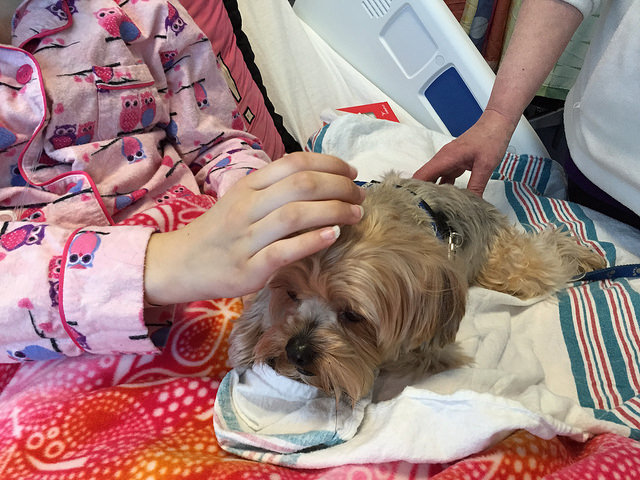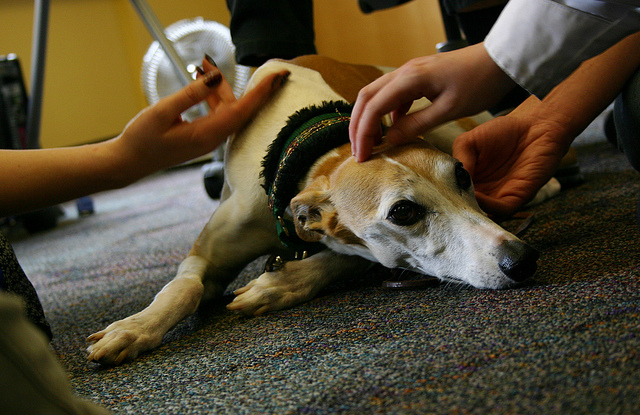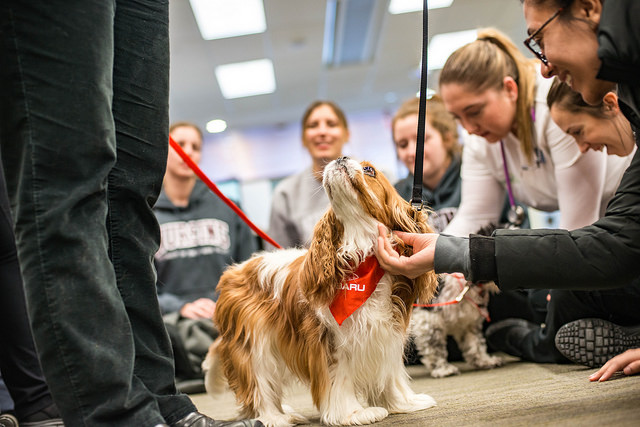Therapy dogs provide a variety of public services such as visiting hospital patients and helping schoolchildren with their reading skills. Unlike service dogs, therapy animals do not perform specific assistance tasks. They simply offer companionship and affection.
Therapy dog candidates should be obedient and trainable, but they must also possess certain traits that cannot be taught.

If you have considered pursuing therapy dog certification for your pup, ask yourself if he or she has the following qualities:
1. Highly Social With ALL Humans

Above all else, therapy dogs must love people of all ages, genders, sizes, shapes and colors. They should be the kind of dogs who make friends everywhere they go and are not the slightest bit fearful of the diverse array of sights, sounds, smells and accessories that come along with new humans.
2. Extremely Calm

Unfortunately, some of the most social, human-loving pups are also quite boisterous. They get so excited in the presence of new people that they bark, lick, mouth, paw or jump up – behaviors that could be dangerous around senior citizens, small children or hospitalized patients.
The best therapy dog candidates are content to sit quietly by a human’s side and enjoy frequent cuddles, ear scratches and belly rubs. For this reason, older dogs often make better therapy animals than younger, more excitable pups.
3. Non-Reactive

Hospitals, senior centers and schools each have their share of strange noises and potentially frightening distractions. Therapy dogs must be capable of keeping their composure in the presence of wheelchairs, stretchers, zooming crash carts, alarms, sirens, squealing children and so much more. In addition, they must not react with fear or aggression when bumped, grabbed or even accidentally stepped on.
4. Cleanliness & Good Health

Many of the people therapy dogs serve are immune compromised due to age or illness. Before a dog can enter a pediatric or oncology ward, they are often required to undergo rigorous testing to ensure they are not an infection risk to the patients.
At minimum, therapy dogs are expected to be well-groomed, parasite-free, pleasant smelling and up-to-date with all their basic veterinary requirements.
It is also important that the dog’s health is preserved. For example, a pooch with food allergies may not be the best candidate to visit a nursing home where he or she could be exposed to various treats and “human foods”.
5. Willingness to Learn

Successful therapy dogs must have excellent manners when walking on a leash and responding to the sit, stay and come commands – but these are just the basics. The best therapy dogs are always working on new, more advanced commands and tricks to better serve and entertain the folks they visit.
6. Able to Stay Focused Around Other Animals

Many therapy dogs work in teams while others may be exposed to dogs, cats, birds, pocket pets and wildlife while working. As difficult as it may be, these highly social dogs must be able to resist the urge to interact with other animals while performing their duties.
7. Desire to Work

Even if a dog has the perfect personality for therapy work, it may be too much of an emotional burden. We previously mentioned the importance of physical health, but these dogs must also be emotionally resilient. Much like the compassion fatigue experienced by human caregivers, therapy work can be draining for dogs. They are incredibly intuitive and can become depressed or anxious when surrounded by so much pain.
On the other hand, some dogs seem to have been born for therapy work. They possess all of the above traits as well as a talent and desire for connecting with the people who need them most.
If you would like to learn more about pursuing therapy dog certification, click here to find an organization in your area!
Featured Image via Flickr/Arctic Warrior
